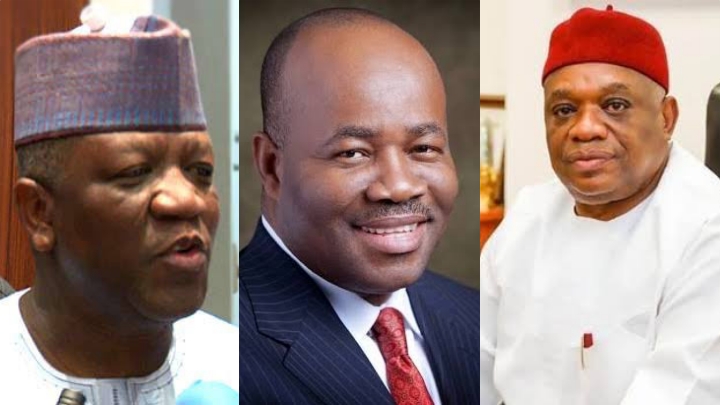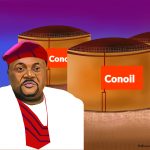...To get all news updates, Join our WhatsApp Group (Click Here)
Also Join our WhatsApp Channel (Click Here)
A former governor of Akwa Ibom State, Godswill Akpabio, is in the race for the Senate President’s seat with baggage of corruption allegations. Despite this, his party, the ruling All Progressives Congress (APC), on Monday, picked him as its choice for the office.
The party, which by convention stands to produce the senate president by virtue of its having the majority in that chamber of the incoming 10th National Assembly, now hopes that the would-be members of the Red Chambers would overlook Mr Akpabio’s pending corruption case, in addition to the task of convincing other five contenders for the high office to withdraw from the race.
Mr Akpabio, Orji Kalu, a former governor of Abia State; and Abdulaziz Yari, a former governor of Zamfara – are frontrunners in the race for the top seat of the Senate despite bearing the weight of corruption investigations that have lasted for between seven and 16 years.
The rest, who are serving senators and senators-elect – Sani Musa, representing Niger East Senatorial District; Mohammed Jubrin Barau, representing Kano North, and Osita Izunaso, representing Imo West – are not known to have pending corruption cases.
In his case, Mr Kalu was charged with corruption, tried for 12 years, and jailed. He was set free after the Supreme Court ordered a retrial of his case. The retrial is yet to commence.
Messrs Akpabio and Yari have yet to be charged, but face daunting corruption allegations for which they have been detained, and are always in the wait for the next summons by Nigeria’s frontline anti-corruption agency, the Economic and Financial Crimes Commission (EFCC).
None of these seems to be a factor in APC’s equation for choosing its candidate for the Senate President. The days when the anti-corruption profile of the outgoing leader of the party, President Muhammadu Buhari, was perceived to be a threat to the ambition of politicians with corruption-tainted records are long gone.
His party, which rode to power on the promise to tackle and disincentivise corruption in 2015, turned out to be a haven for politicians struggling to regain political relevance and seeking to be relieved of weights of corruption allegations. Mr Buhari himself led the way in appointing a number of candidates, including Mr Akpabio, burdened with corruption cases to top offices, even though his government vowed not to drop cases against anyone based on political considerations.
That the APC announced Mr Akpabio’s emergence as the APC’s choice on Monday underscores the party’s divorce from its “change” mantra that brought it to power in 2015, and setting the stage for the emergence of another Senate President entangled in corruption investigations and legal proceedings as it was in the 8th National Assembly.
Bukola Saraki became the Senate President in 2015 despite being dogged by various corruption allegations dating back to his time as the Governor of Kwara State between 2003 and 2011. He ended up spending over half of his tenure shuttling courtrooms to answer to charges, and battling forfeiture proceedings. He faced prospects of fresh investigations by the EFCC, while his associates faced relentless probes and prosecution.
His trial for alleged forgery of the Senate rules at the FCT High Court for four months, and the one at the Code of Conduct Tribunal (CCT) on asset declaration breaches for over two years, became pivotal to the Senate’s business. While the forgery case was withdrawn by the federal government in October 2016, after four months, the CCT trial ended with a judgement of the Supreme Court exonerating him of the asset declaration-related charges in July 2018.
Mr Saraki inadvertently drew the Senate in as a co-suspect in his efforts to prove his innocence.
He attended his trial with as many as 50 senators, stalling the proceedings of the Senate whenever scheduled legislative sittings clashed with his court trials. The Senate attempted to gain control of the CCT and the Code of Conduct Bureau (CCB) and devised a series of legislative tactics to disrupt Mr Saraki’s trial at the CCT.
About four years after Mr Saraki ended his tenure as Senate President, the echoes are brought back to the present by the frontline candidates jostling for the high office.
It is likely that the emergence of any of the three candidates will upend hopes of possible retooling of the anti-corruption war of the APC government that has failed to tame entrenched corruption in the country.
What follow are the cases each of the three frontline candidates are facing.
Orji Kalu
Mr Kalu, 63, is the current senator for Abia North. He became the Chief Whip in the Senate in 2019.
He was one of the first to publicly announce interest in the Senate President’s seat after his re-election on 25 February.
He is spurred by considerations of ethnoreligious balance in the next government that favour ranking senators from either his South-east zone or neighbouring South-south zone.
A former governor of Abia State for two terms between May 1999 and May 2007, Mr Kalu left the Peoples Democratic Party (PDP) in the fallout of a rift with then President Olusegun Obasanjo, to form the defunct Progressive People’s Alliance (PPA) in 2007.
Since leaving office in 2007, he has aspired, but failed to hold other public offices, until fortune started to smile on him after joining APC in November 2016.
Among other former governors in the race for the Senate President’s seat, Mr Kalu has the longest-running corruption case. He had been charged, tried, jailed, and still faces the prospect of a fresh trial.
His case traces back to his days as governor. EFCC filed money laundering charges against him within a month of his stepping down on 29 May 2007 from an office that clothed him with immunity from prosecution.
In the charges filed against him in June 2007, EFCC accused him, along with his co-defendants, of diverting over N3.2 billion from Abia State coffers.
After years-long stalling of the case, the Supreme Court on 18 March 2016 cleared the legal encumbrances for his trial to begin.
The trial began afresh at the Federal High Court in Lagos. As the trial grew in intensity, Mr Kalu’s chances of a political comeback also dwindled. Mr Kalu made the deft move of joining the APC in November 2016.
His defection, well received within APC, drew criticism from the Nigerian public.
At the time of his defection to the APC, details of his alleged plundering of the coffers of the Abia State government were being unravelled in court. The court heard how Mr Kalu allegedly perpetrated the fraud with the help of his co-defendants – his firm, Slok Nigeria Limited, and Udeh Udeogu, who was Director of Finance and Accounts at the Abia State Government House.
The EFCC said the defendants used Slok’s account to divert the funds from the Abia State’s accounts with Standard Trust Bank (now United Bank for Africa), Citizens Bank (later Spring Bank), and Manny Bank (now Fidelity Bank).
It said the defendants “converted” the funds into various bank drafts “before they were subsequently paid into the said company’s account.”
They denied the charges. But not convinced by their denial, the trial court found them guilty in December 2019. It sentenced Mr Kalu to 12 years in jail, his co-defendant to 10 years, and ordered the winding up of Slok.
But five months into serving his jail time, a Supreme Court decision nullified his conviction on technical grounds: that the judge who jailed him was ineligible to handle the trial having been elevated to the Court of Appeal’s bench as of the time he concluded the case.
The Supreme Court also nullified section 396(7) of the Administration of Criminal Justice Act enabling the judge to return to the Federal High Court to conclude the 12-year-old trial. The court, however, held back an acquittal and ordered a fresh trial in the case.
After using the Supreme Court judgement to get out of jail, Mr Kalu placed legal obstacles to the order of retrial given by the court. A ruling by the Federal High Court in Abuja in September 2021 helped him to stave off the re-trial, while EFCC continues its dogged quest to restart the trial.
The EFCC has since appealed against the decision, with the EFCC’s chair, Abdulrasheed Bawa, repeatedly vowing to ensure Mr Kalu is brought to trial.
If Mr Bawa’s hopes and Mr Kalu’s aspiration of becoming the Senate President materialise soon, the politician may end up being the second sitting Senate President to face trial in less than five years.
Mr Kalu, who backed the failed bid of the outgoing Senate President, Ahmad Lawan, to pick the APC’s presidential ticket last year, has said it is his turn to lead the Senate. He is banking on the support of both President Buhari and the president-elect, Bola Tinubu.
Godswill Akpabio
The Akwa Ibom North West senator, 60, joined active politics in 2002 when then governor of Akwa Ibom State, Victor Attah, appointed him as commissioner.
He later succeeded Mr Attah as governor in 2007 and went on to win reelection in 2011.
A staunch PDP member, he won his election to the Senate months before completing his tenure as governor in 2015. He stepped down as governor on 29 May 2015 and was inaugurated as a senator in June.
A first-timer in the Senate, Mr Akpabio pulled his political weight to snatch the position of Minority Leader in the APC-dominated chambers from candidates who ranked higher by virtue of their record of previous election to the Senate.
But no sooner had Mr Akpabio left office as governor and begun to settle into his senatorial duties, than allegations of corrupt practices that he allegedly perpetrated while superintending over the treasury of his state began to emerge.
In June 2015, a lawyer, Leo Ekpeyong, who hails from Akwa Ibom, accused Mr Akpabio of stealing N108.1 billion of Akwa Ibom funds in a petition he sent to President Buhari and the EFCC.
The petition detailed how Mr Akpabio allegedly colluded with a former Government House Permanent Secretary and a former Accountant General of the state to steal the funds.
It said the trio of Mr Akapio and the two other officials “made illegal but substantial withdrawals of cash from a designated state government-owned account with Zenith Bank with account number: 1010375881 amounting to N22.1 billion.”
“For example, a whopping N18 billion was withdrawn fraudulently from the state FAAC account with the United Bank for Africa in trenches of N10 million and above by Mr Isobara in a surreptitious manner to conceal their dishonest intention.”
He also accused Mr Akpabio of expending over N50 billion taken from the coffers of Akwa Ibom during the 2015 general elections.
He claimed that Mr Akpabio withdrew a whopping N18 billion from the state coffers under the guise of special services, reception of very important guests and sundry items.
“The cumulative aggregate of these monies stolen by Godswill Akpabio from the coffers of government as pocket money is the annual budget of some states in Nigeria put together,” the petition reads.
EFCC invited the petitioner to adopt his petition in June 2015, signalling the start of investigations into the case.
As a follow-up to that, the commission, four months later in October 2015, detained Mr Akpabio for interrogation.
Coming out of detention, Mr Akpabio, however, said he was neither arrested nor detained as reported, but only honoured EFCC’s summons to answer corruption allegations against him.
In another two years, Mr Akabio had turned into a political alien in a state where he was once a king and a kingmaker. Pending EFCC investigations only added to his woes.
Like a humbled war commander, he turned to the adversary’s camp for protection. He dumped the PDP for the APC in August 2018. The move cost him his status as a principal officer as the Minority Leader of the Senate. For him, the future was more important than an extra luxury of the moment.
But things did not work out as he planned. Although, he managed to push aside the pioneer members of the APC in the state to pick the party’s senatorial ticket for his district, he lost the general election.
He, however, got succour from President Buhari, who appointed him as Minister of Niger Delta, despite EFCC’s ongoing investigations into his corruption case.
The appointment served its purpose for him as investigations immediately went cold, while he held a crucial cabinet position.
Time dulled attention on the case, but not its substance. With Mr Akpabio out of office and Mr Buhari in the twilight of his administration, EFCC recently dusted its files on him.
The EFCC in a recent letter asked Mr Akpabio to “personally report” for interrogation on 9 May.
But despite his burden of corruption allegations, the APC has picked Mr Akpabio, who is believed to be the closest to the president-elect, Mr Tinubu, as its preferred choice for the Senate President’s seat. Prelude to the party’s decision were the formidable endorsements he had received from APC governors, and separately from the outgoing APC governor of Ebonyi State, Dave Umahi, who dropped out of the race to back the former Akwa Ibom governor.
Abdulaziz Yari
Mr Yari, the senator-elect for Zamfara West, 55, served in various roles in his former party, the All Nigeria’s Peoples Party (ANPP), until 2007 when he won an election to the House of Representatives to represent his Anka/Talata Mafara Federal Constituency.
He was elected the governor of Zamfara State on the ANPP platform four years later in 2011. In 2015, his faction of the ANPP merged with other parties to form the APC. He contested and won his second term in office as governor on the platform of APC that year.
As governor, he became the chair of the Nigeria Governors’ Forum (NGF) at a time the federal government refunded to various states, huge sums of money deducted from their accounts for the repayment of Paris Club and London Club loans between 1995 and 2002.
Unlike Messrs Kalu and Akpabio, Mr Yari had not been elected to the Senate, although he had been a member of the House of Representatives. Mr Yari’s ambition to go the Senate in 2019 after completing his second term as governor was truncated by a Supreme Court judgement that voided the victory of all APC candidates in the state.
But like Mr Akpabio, Mr Yari has teetered on the brink of corruption trial over the years. He piled up different corruption cases during his time as governor, although he has yet to face any charges in court. His name has featured in various court filings linking him to a slew of assets – cash and tangible ones – suspected to be proceeds of corruption.
He is a suspect in corruption cases under investigations by the EFCC and its sister agency, the Independent Corrupt Practices and other related offences Commission (ICPC).
In February 2021, EFCC detained him for a long interrogation session with detectives at its Lagos office, over an alleged attempt to illegally move N300 billion from a corporate account in a new generation bank.
About a month before his detention by the EFCC, the ICPC had, in an apparently unrelated case, obtained an order of the Federal High Court in Abuja for final forfeiture of suspicious funds found in bank accounts bearing his name and the names of his companies.
The forfeited funds included $56, 056.75 lodged in a Polaris Bank account. The rest are the sums of N12.9 million, N11.2 million, $301, 319.99; N217, 388.04 and $311, 872.15 were kept in different Zenith Bank accounts.
In April 2021, EFCC also held him at its Sokoto zonal office for hours-long interrogations. It similarly held him for another round of interrogation in May 2022, a year ago.
Although EFCC has yet to publicly disclose its case against Mr Yari, sources and court filings have provided a glimpse.
In 2017, about two years before Mr Yari completed his tenure as governor, EFCC traced to him N500 million and $500,000 believed to have been fraudulently taken from Paris Club refunds meant for the 36 states.
EFCC alleged in a court forfeiture filing that it received an intelligence in January 2017 alleging “conspiracy, criminal misappropriation of public funds” involving about N19.4 billion paid to the Mr Yari-led NGF for onward disbursement to the states.
The NGF allegedly mismanaged the funds through the spurious engagement of consultants for the recovery of the money. The funds were being paid to the states by the federal government.
The Federal High Court in Abuja, on 30 June 2017, issued an interim order of forfeiture of the N500 million and $500,000 traced to Mr Yari.
The judge, Nnamdi Dimgba, however, rejected EFCC’s further request for a permanent forfeiture of the funds, because third parties were able to establish their ownership of the money.
But the case of diversion of the Paris Club refunds remains one of the issues for which Mr Yari is being investigated by the EFCC.
The APC’s zoning of the Senate President to the South-south and narrowing its choice down to Mr Akpabio is a major erosion of the base Mr Yari is banking on.
But Mr Yari is not a politician that is swayed by zoning. In 2022, he defied his party’s zoning to pick the nomination form to contest for the national chairman of the party, although he lost out.
But in general, while zoning may matter to the APC, the question is whether the party will pay equal attention to the corruption profiles of the candidates jostling to be the Senate President and its implications for the nation in June.
Premium Times.
You can get every of our news as soon as they drop on WhatsApp ...To get all news updates, Join our WhatsApp Group (Click Here)
Also Join our WhatsApp Channel (Click Here)

















